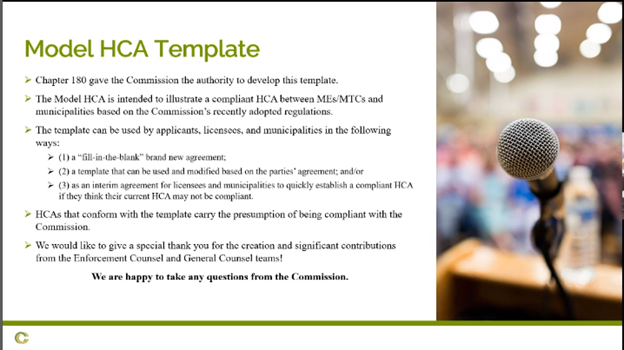Following the Massachusetts Cannabis Control Commission’s (CCC) meeting on January 11th, 2024, the CCC disseminated a “model” template for Community Host Agreements (CHAs) applicable to both Marijuana Establishments (ME) and Medical Marijuana Treatment Centers (MTC). Although the HCA model has not been officially ratified, the CCC has asked for stakeholders to give their opinions and recommendations about the model HCA prior to the CCC’s next meeting in February. With regards to the timing of signing HCAs, for both new applicants and application renewals, by March 1st, 2024, the CCC is going to require applications contain compliant HCAs and/or a waiver of an HCA. Furthermore, the use of this “model” HCA template, without material changes to the contract, carries a presumption of being compliant with the CCC
Under Massachusetts state law, MEs and MTCs are mandated to execute Host Community Agreements (HCAs) with the municipalities where they plan to operate. The HCA delineates the “obligations and responsibilities of both the municipality and the applicant or licensee.1” This model template is designed to standardize and guide the negotiation process between the two parties. The CCC encourages municipalities to carefully consider the impact of proposed Marijuana Establishments and Medical Marijuana Treatment Centers on the community, emphasizing factors such as local revenue, hiring practices, security, Community Impact Fees, and employment benefits.
The model HCA template, as it stands, provides possible provisions that may be incorporated into required HCAs, including but not limited to:
- Local and General Employment Opportunities: The model HCA stipulates that MEs or MTCs must make jobs available to residents of the municipality without hindering compliance with anti-discrimination and employment laws. Furthermore, the model HCA also stipulates that MEs and MTCs will “make progress towards those goals to hire individuals/businesses identifying as, as people of color, particularly Black, African American, Hispanic, Latinx, and Indigenous people, women, Veterans, persons with disabilities, and LGBTQ+ people.”
- Annual Payment Responsibilities The model HCA attempts to address municipal uptick in costs and impacts and includes a provision that obligates the company to pay a Community Impact Fee (CIF) to the Municipality. Specifically, the impact fee claimed by the Municipality cannot exceed 3% of the Company’s gross sales and cannot be calculated as a percentage of the Company’s sales. Additionally, no impact fees can be assessed after the eighth year of the Company’s operations, and the Municipality cannot collect impact fees after the ninth year of holding a Final License for a particular ME(s)/MTC(s).
- Municipal CIFs Itemization: The model HCA acknowledges that the municipality must provide an annual itemized invoice of claimed impact fees within one month of the license anniversary, detailing how the fees were spent. Failure to provide the invoice within the prescribed time results in the forfeiture of any entitled CIF for that year. The Company must pay undisputed CIF annually by the end of the fiscal year or within 90 days of the Commission’s CIF certification, whichever is later. However, the Company is not obliged to pay the CIF during a “nonfrivolous legal dispute.”
- Waiver of Community Impact Fee: The model HCA contains a provision that gives the municipality an ability to waive the Community Impact Fee.
- Security: The model HCA acknowledges that the Company must maintain security at its ME(s)/MTC(s) in accordance with the security plan presented to the Municipality and approved by the Municipality’s Police Department and the Commission.
- Termination Provisions and Deadlines: The model HCA contains stipulations regarding the termination of the agreement by the ME or MTC.
- Community Support and Outreach: Details may be outlined on how MEs or MTCs will assist with community support, public outreach, employee outreach programs, and municipal-sponsored educational initiatives.
For more information about these recent developments, Host Community Agreements and the evolving Massachusetts cannabis marketplace, please contact Mike Ross, John Bradley, Dan Glissman or any other member of the Prince Lobel Cannabis Team.
With thanks to Alexander Hymowitz for his work on this Client Alert.
[1] https://masscannabiscontrol.com/host-community-agreement/


